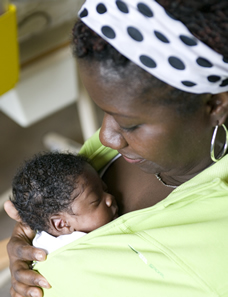Neonatal Intensive Care Babies

In this article, you will find:
Assisting your baby
Some babies need a little extra oxygen, while others need constant oxygen through a nasal tube. For very premature babies, a tube may be placed into the trachea (windpipe) and connected to a ventilator that blows oxygen into the lungs. Babies are monitored to see when they can be weaned off the ventilator.
Most babies in intensive care need one or more IVs to give fluids, blood, and antibiotics. Very small babies may be fed through a long, fine feeding tube running through the mouth or nose to the stomach. They may also need at least one blood transfusion, for some cases of conditions like anemia and jaundice.
Antibiotics are often given to prevent infection. Some babies need medicine to keep their blood pressure up, and many who are ventilated need medicine to sedate them and to prevent or treat pain.
How you can help your baby
For most, the experience of having their baby in a NICU is extremely stressful. Parents may feel that they have no role in the care of their baby; however, this is not the case. The most important thing you can do for your baby is to start expressing breast milk. Breast milk will nearly always be the best milk for a premature baby and can be stored in a freezer until needed.
You may be able to touch and stroke your baby and can be helped to cuddle him while he is on a ventilator. Babies thrive on skin-to-skin contact, called kangaroo care. You'll be encouraged to tuck your baby on your chest inside your shirt so that he can enjoy a close bond. Talking, reading, and singing to your baby helps him become familiar with you. You may be able to change his diaper and help with feedings, even if these are through a nasogastric tube.
Spend plenty of time with your baby, especially when breast-feeding since this may help the letdown reflex , but save some time for yourself too so that you conserve energy for when you return home with your baby.
Babies who are nursed in a quiet, calm environment progress better
Research shows that babies who are cared for in quiet units with subdued lighting go home sooner that those who are nursed in a noisy unit with bright lights on throughout the day and night.

Carrying your baby close to your body and enjoying skin-to-skin contact together will help your tiny baby thrive.